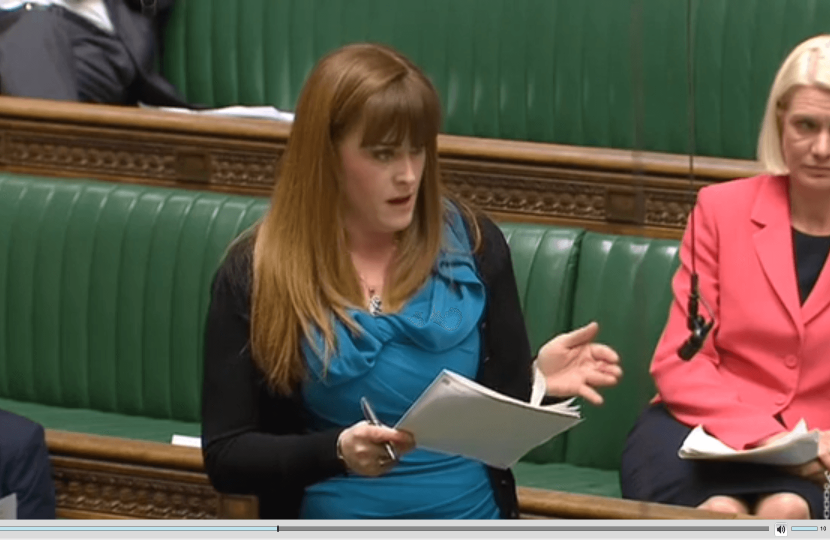
This week is National Apprenticeship Week and the growing number of people in Rochester and Strood starting apprenticeships demonstrates that we are delivering on our manifesto commitments.
The theme for this year’s National Apprenticeship Week is that an Apprenticeship can take you anywhere, as a growing number of young people are looking to an apprenticeship as an alternative route for people who don’t want to go to university. Apprenticeships make sense for young people across the constituency, which is why 7,410 new apprentices have started since May 2010 and over 2.6 million new apprenticeships have started across England.
On Thursday 10 March, I was present for the Minister for Skills’ statement on apprenticeships, where I was pleased to hear about the Government’s positive updates on progress towards 3 million high quality apprenticeships by 2020 (see below). Following the statement, I was able to draw his attention to the great news in Rochester and Strood, and particularly that at MidKent College, which has had more than 100 new engagements with employers since last September. I was keen to receive assurances that the Government will continue to work with our colleges to ensure that we have the correct provision in place and that we continue to develop it in order to keep up with the demand in constituencies such as mine.
The Minister confirmed he had recently met with college leaders to discuss this matter. He also informed me that colleges secure only one third of the money that is spent on apprenticeship training, but he will be doing everything to help them to secure two thirds of that funding. this would represent a great step, because a great further education college can be the heart of a community that is investing in young people and local employers.
I want to give young people the chance to get the skills that they need to get on in life. That’s why I am supporting the Government’s commitment to create 3 million apprenticeships by 2020 and congratulate every college and business locally that has taken on an apprentice. The Government also plans to launch the new independent, employer led, Institute for Apprenticeships. The Institute will regulate the quality of apprenticeships in England, taking on responsibility for approving new apprenticeship standards and assessment plans. Only standards that are valued by employers will be approved and funded.
Additionally, a recent survey conducted by Populus for the Chartered Management Institute (CMI) has revealed parental attitudes towards apprenticeships have become more favourable over the last five years. The new Degree Apprenticeships combine the strengths of higher and vocational education to offer apprentices the best of all worlds through a triple guarantee of a degree, on-the-job experience and professional development through to Chartered status.
Developed in partnership with some of the UK’s top employers and leading business schools, the new Degree Apprenticeship is now offered by major companies such as Serco, Nestle and Barclays, in association with CMI. This has resulted in 61% of parents favouring a Degree Apprenticeship with a major company such as M&S or Rolls-Royce over a traditional degree from Oxbridge, chosen by 39%.
Government progress towards 3 million apprenticeships
- Raising quality: Our reforms put employers at the heart of developing new apprenticeship standards, which set out what an apprentice must learn to be competent in an occupation. Over 1,300 employers are developing apprenticeship standards in sectors from nuclear to fashion, digital, law, banking and transport. Over 200 standards have been published, including more than 60 for Higher and Degree apprenticeships. We are also legislating to protect the term apprenticeship from misuse.
Sustainable funding: We are putting the funding of apprenticeships on a sustainable long-term footing. Between 2010-11 and 2019-20 we will double in cash terms the annual level of spending on apprenticeships in England to £2.5 billion. To achieve this, from April 2017 we will introduce an Apprenticeship Levy on UK employers in both the private and public sectors. It will be set at 0.5% of an employer’s pay bill where this is more than £3 million.
Employers in England will be able to access funding equivalent to their levy payment via the Digital Apprenticeship Service. Employers committed to apprenticeship training will be able to get out more than they pay in, through a top-up to their digital account. More details on funding arrangements for all employers and providers will be published later in the Spring.
From April employers of apprentices under the age of 25 will no longer be required to pay National Insurance contributions up to the Upper Earnings Limit. This will make it over £500 a year cheaper to employ an apprentice earning £12,000. We have also extended the Apprenticeship Grant for Employers to the end of the 2016-17 academic year to provide funding of £1500 to small businesses for their first five apprentices aged 16-24.
Reforming governance: To guarantee quality we are legislating to create a new Institute for Apprenticeships (IfA). Independent of Government, the IfA will approve standards and assessment plans and advise on the funding for future standards. It will be employer-led, with a majority of its Board drawn from employers. We aim for it to be operational from April 2017.
Public Sector reform: The public sector will play a leading role in achieving more high quality apprenticeships. We have consulted on a new target for public sector bodies with 250 or more staff in England that 2.3% of their workforce to be apprentices. We have also changed procurement rules so that bids for central government contracts worth more than £10 million and lasting more than 12 months must demonstrate commitment to apprenticeships;
Extending opportunity: The Prime Minister has set a target of increasing the proportion of Black and Minority Ethnic apprentices by 20% by 2020.



